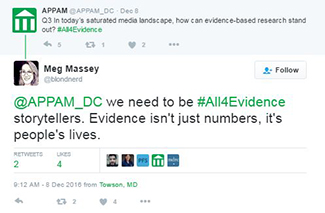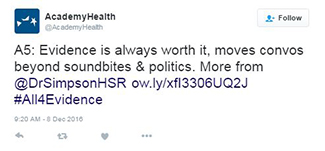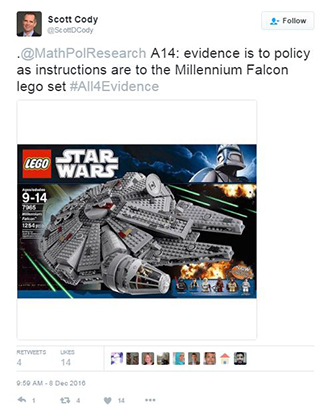There’s not a partisan way to pick up the trash.
 When I worked for a big city mayor back in 1998, he would remind my colleagues and me of this simple truism regularly, encouraging us to make our community a better place to live by always placing people before politics. Whether we were analyzing the need for new speed bumps on a busy residential street or using GIS technology to identify potential correlations between truancy rates and the number of liquor licenses in certain areas, I cut my professional teeth on the philosophy that, at its core, public policy is about improving people’s lives by making problems smaller—with the help of objective facts and programs that work.
When I worked for a big city mayor back in 1998, he would remind my colleagues and me of this simple truism regularly, encouraging us to make our community a better place to live by always placing people before politics. Whether we were analyzing the need for new speed bumps on a busy residential street or using GIS technology to identify potential correlations between truancy rates and the number of liquor licenses in certain areas, I cut my professional teeth on the philosophy that, at its core, public policy is about improving people’s lives by making problems smaller—with the help of objective facts and programs that work.
I transitioned from that big city with a small-town feel to Washington, DC, nearly two decades ago, and the contrasts are not as stark as I was warned they would be. Yes, Washington can be a grownup’s version of Disneyland for politicos, pundits, and those looking to make a name (or a buck) by advancing partisan positions. But more than that, it is a hub for people who are eager to make policies and programs as effective and efficient as possible in addressing the challenges our local and global communities face. My Mathematica colleagues and I are committed to improving public well-being by providing decision makers with unbiased information as they develop policies and programs; we’re dedicated to promoting the need for—and impact of—evidence-based policymaking. And we’re not alone.
 Last week, Mathematica teamed up with several organizations to co-host a Twitter chat around the theme of #All4Evidence. With new and returning lawmakers defining their policy priorities for 2017 and beyond, we thought this would be an opportune time to redouble our efforts to raise awareness about how rigorous, objective research can inform critical policy decisions. Our goal with this chat was to foster discussions about issues such as:
Last week, Mathematica teamed up with several organizations to co-host a Twitter chat around the theme of #All4Evidence. With new and returning lawmakers defining their policy priorities for 2017 and beyond, we thought this would be an opportune time to redouble our efforts to raise awareness about how rigorous, objective research can inform critical policy decisions. Our goal with this chat was to foster discussions about issues such as:
- How evidence has impacted government policy
- How to identify high quality evidence
- Ways that policymakers and practitioners can use evidence to inform decision making
- Strategies for making research accessible to the policymakers who need it
- The promise of evidence to help address some of the most challenging issues ahead
And it was a great success! The chat included nearly 600 tweets and retweets in just an hour, showing that there is a vibrant community dedicated to evidence-based policymaking. With insightful contributions from organizations and individuals representing independent research organizations, universities, professional associations, and programs, the #All4Evidence Twitter chat offered real-world examples of the power of evidence to improve policies and programs. When you check out the Storify recap of the session, you’ll note that it was devoid of partisan talking points. Instead, you will find many examples of the imperative of infusing policies and programs with evidence, as told from the perspectives of those who see the ground truth every day.
For nearly 50 years, Mathematica has been producing high quality work to help local mayors like the one I worked for, as well as federal and state officials, international development organizations, foundations, and other decision makers understand the effectiveness of their programs and initiatives. Today in Washington, evidence-based policymaking is a bigger priority than ever, as seen by the creation of the federal Commission on Evidence-Based Policymaking—yet, more progress must be made.
 As the information landscape becomes more crowded, it’s critical for Mathematica and other research organizations to get evidence to the right people in the right format at the right time. That’s why we engage directly with policy and program leaders at all levels of government, why we launched this blog, why we convene policy forums and roundtables discussing topics like the features of high quality pre-K programs, and why we develop tools and resources such as the #EvidenceInsight video series, which highlights cutting-edge research methods, as part of our efforts to connect the research and policy communities.
As the information landscape becomes more crowded, it’s critical for Mathematica and other research organizations to get evidence to the right people in the right format at the right time. That’s why we engage directly with policy and program leaders at all levels of government, why we launched this blog, why we convene policy forums and roundtables discussing topics like the features of high quality pre-K programs, and why we develop tools and resources such as the #EvidenceInsight video series, which highlights cutting-edge research methods, as part of our efforts to connect the research and policy communities.
Last week’s Twitter chat showed that there is a great appetite for expanding the conversation about evidence-based policymaking. We hope that you will follow #All4Evidence in the coming weeks and offer your own perspectives on how research can drive decisions that improve our society. From my days in the mayor’s office making sure city services operated smoothly to my time at Mathematica today, I’ve been honored and energized by the opportunity to work alongside people who care deeply about our future, and I’m excited to see this momentum continue to build.


